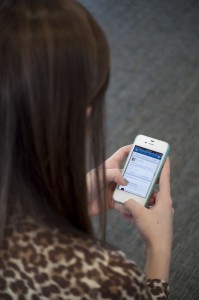Cell phones are more like pocket-size computers than calling devices for many students, helping them to effortlessly integrate their personal, professional and academic lives.
Tyler Murphey, a history major, said he views his smartphone as a professional and academic tool.
“I did summer sales, so I could show my customers slides of the product, or I could show them how they could control a security alarm through my phone,” Murphey said. “It greatly enhanced my ability to sell.”

Murphey’s smartphone also helps increase the efficiency of his studying.
“It’s nice to have the Internet there to just research things,” Murphey said. “If I’m studying something and don’t understand a concept or a word, I can look it up really quickly, and I don’t need to have my laptop.”
Economics major Matt Hubbard said his smartphone is essential when he travels.
“When I went to New York, I didn’t need anything, I just had my smartphone,” Hubbard said. “I knew which subways to take, and when I wanted to visit my brother I could just enter the address and I was off.”
Despite their positive experiences with smartphones, both Murphey and Hubbard noted some downsides.
“One of the reasons I didn’t want to get a smartphone is that once you get one, you can’t go back, and you have to be ready to pay for the data,” Hubbard said.
Hubbard said he has also noticed the impact of his smartphone on his interpersonal interactions.
“When you have a couple minutes before class, normally I’d spend that time talking, but sometimes I just pull out my smartphone,” Hubbard said. “You definitely don’t engage as much with other people because you can always just pull out your phone.”
Murphey said while his phone can be a useful study aid, it also provides ample opportunity for distraction.
“It’s hard to focus, hard to study when you are constantly receiving emails and text messages and game requests from your friends,” Murphey said. “A lot of times I have to force myself to disconnect by turning off my cell phone. It affects your studies.”
Hubbard’s and Murphey’s reasons, among others, are why some students find that the monetary and social costs of a smartphone outweigh any convenience and are content with their phones’ basic calling and texting functions.
Andrew Ray, a neuroscience major, could have made the switch to a smartphone but chose not to.
“When I changed my contract, I had the opportunity to add a smartphone for only about another $15 for unlimited data, but I decided against it because I have a computer and I figured I would waste a lot of time if I had a smartphone,” Ray said. “All I really need in a phone is the ability to talk and text.”
Even though he recognizes the convenience of a smartphone, Ray isn’t planning on switching over soon.
“It would be nice when I leave for the weekend to not have to bring a computer, but it’s not a huge hassle, and I think the benefits of not having a smartphone still outweigh the benefits of having one in my life at this time,” Ray said.
For Natalie Nysetvold, a teaching social science major, it’s more convenient to stick with her “dumb” phone.
“If I were going to switch to a smartphone, I would have to pay for the data,” Nysetvold said. “As long as I can stay on my parents’ plan, I can have a ‘dumb’ phone for free. It’s not worth 15 bucks a month to me to have a smarter one.”
Biology major Tessa Hatch is also on a family plan.
“My family got a Verizon plan, and there never really was a need for smartphones — I didn’t feel like it was necessary,” Hatch said. “Honestly, I feel like what you could do on a smartphone, you could do on your computer. Yeah, it’s two different devices, but I could just look it up later.”
Although Hatch foresees switching to a smartphone in the future, for now she is happy with her phone’s basic texting and calling capabilities and doesn’t miss the sleek touchscreen of a smartphone.
“I really like to press buttons,” Hatch said.




